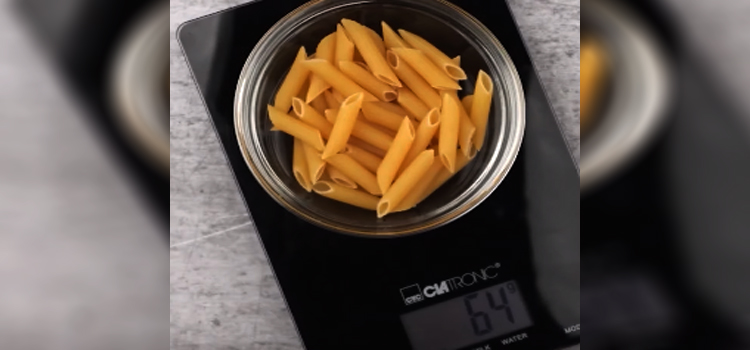Last Updated on September 12, 2024 by Shari Mason
It is likely that, like many people, you usually measure a specific amount of uncooked pasta before cooking it according to the given instructions.
But have you ever considered whether you should weigh your pasta before or after you cook it?
Let’s discuss the pros and cons of weighing pasta before and after cooking and provide tips to help you determine the best method for your needs.
Should You Weigh Pasta Before Or After Cooking?


If you’re looking for the most accurate measurement, weigh the pasta before cooking it. This will give you a precise measurement of how much pasta you have.
However, if you’re trying to estimate how much cooked pasta you have, you should weigh it after cooking.
This is because cooked pasta can expand, so you may end up with more cooked pasta than you started with.
Additionally, some pasta, such as lasagna noodles or ravioli, may contain fillings that can affect the weight of the cooked pasta.
When weighing pasta, make sure you have the right equipment.
A kitchen scale is the most accurate way to weigh pasta, but you can also use measuring cups or spoons. It’s important to measure the pasta accurately to get the desired results.
Remember that some cooked pasta will absorb liquid, affecting the final measurement.
As such, you should weigh the cooked pasta as soon as possible after draining it to get the most accurate measurement.
Read: Do You Season Fries Before Or After Frying?
How Do You Weigh It For Calories?
Before cooking, measure your desired amount of uncooked pasta using a food scale.
Once you have the desired pasta weight, you can calculate the calorie count by multiplying the number of ounces of pasta by the calories per ounce.
This will give you the total calorie count for the pasta.
Read: How Much Does A Bulb Of Garlic Weigh?
Pros & Cons Of Weighing Pasta Before & After Cooking
Pros:
- Weighing pasta before and after cooking allows for precise portion control, which is especially beneficial for those following specific dietary plans.
- It can help you better understand how much pasta absorbs water, allowing you to adjust cooking times or ingredient quantities to get the desired texture and flavor.
- Weighing pasta before and after cooking can help you save money. You can buy the exact amount of pasta you need, which prevents you from having to throw away leftover portions.
Read: How Much Does The Average Potato Weigh?
Cons:
- Weighing pasta before and after cooking requires extra time and effort.
- It can be difficult to get precise readings when measuring wet pasta due to difficulty determining the amount of water absorbed.
- The moisture absorbed by the pasta during cooking can vary, depending on the type of pasta and the cooking method. This means that the weight of the cooked pasta may not be consistent.
Read:
Does Pasta Double In Weight When Cooked?
No. Pasta [1] will not double in weight. However, it may double in volume when cooked.
The weight of pasta can increase by 20-25% when cooked, depending on the type of pasta and how long it is cooked.
The pasta absorbs water and increases in volume, leading to some weight gain.
“Pasta doesn’t make you fat. How much pasta you eat makes you fat.”
– Giada De Laurentiis, Italian Chef
Generally, the longer the pasta is cooked, the more it will absorb water and increase in weight.
However, even after absorbing water, cooked pasta’s weight will not double its dry weight.
Read: What Does 2/3 Of A Cup Look Like?
Tips On How To Weigh Pasta


- Measure out the desired amount of pasta using measuring cups: For long pasta (linguine, spaghetti, etc.), measure 1 cup. For short pasta (penne, macaroni, etc.), measure 2 cups.
- Place the pasta on a kitchen scale. Make sure to zero out the scale before adding the pasta.
- Select the desired unit of measurement (grams, ounces, etc.).
- Slowly add the pasta to the scale until you reach the desired weight.
- Carefully remove the pasta from the scale.
- Repeat the process if more pasta is needed.
Read: How Do You Know When Ravioli Is Done?
FAQs
u003cstrongu003eWhy do I weigh more after eating pasta?u003c/strongu003e
When you eat pasta, you are consuming carbohydrates composed of carbon, hydrogen, and oxygen atoms—your body stores these carbohydrates as energy in the form of glycogen and fat. u003cbru003eu003cbru003eThis is why you may weigh slightly more after eating pasta- your body stores the energy from the carbohydrates for future use.
u003cstrongu003eIs pasta serving size before or after cooking?u003c/strongu003e
Pasta serving size is typically measured before cooking.
u003cstrongu003eShould you eat pasta if you are trying to lose weight?u003c/strongu003e
It depends on the amount you’re eating and the type of pasta. If you’re eating whole-grain pasta in moderation, it can be part of a healthy weight-loss plan. u003cbru003eu003cbru003eHowever, it can be harder to lose weight if you’re eating large portions of refined pasta.
In Conclusion
It is important to weigh pasta before cooking, as this will give you a better idea of how much pasta you are consuming and, thus, how many calories and carbohydrates [2] you are consuming.
Additionally, weighing pasta before cooking ensures that it is cooked properly and that the texture and flavor are as desired.
References:
- https://www.delish.com/cooking/recipe-ideas/g3176/weeknight-pasta-dinners/
- https://www.hsph.harvard.edu/nutritionsource/carbohydrates/
- Can You Put an AC Unit in the Kitchen? - September 27, 2024
- What Cheese Does Olive Garden Use? Discover Their Signature - September 27, 2024
- How to Cancel a Pizza Hut Order? Quick & Easy Guide - September 24, 2024


